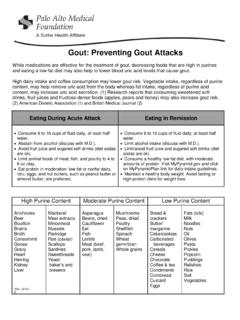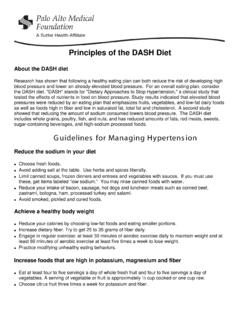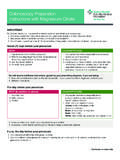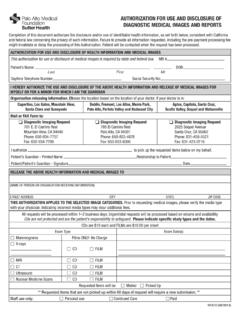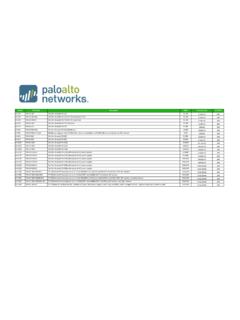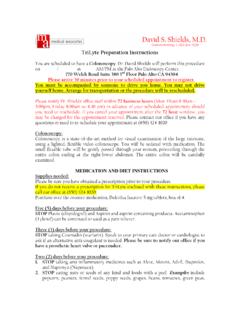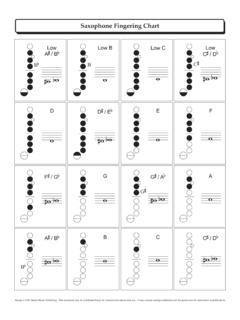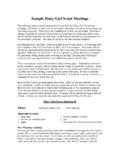Transcription of Warfarin (Coumadin®) and Your Diet - PAMF
1 Warfarin ( coumadin ) and your diet How does what I eat affect Warfarin ? Foods that are high in vitamin K can affect the way Warfarin works in your body. Vitamin K helps your blood clot and works against Warfarin . The more vitamin K-rich foods you eat, the lower the levels of Warfarin in your body. This means your INR will be lower, and you will be more likely to form a blood clot. More vitamin K-rich foods Lower INR ( Warfarin level) Do I need to avoid foods high in vitamin K? No. Although vitamin K works against Warfarin , it is an important part of your diet and actually helps keep your Warfarin levels balanced. It is okay to eat as many vitamin K-rich foods as you like, as long as you can maintain a consistent diet week-to-week. your Warfarin dose can be adjusted to take into account your diet . What does a consistent diet mean? A consistent diet means that on a weekly basis, you eat roughly the same amount of vitamin K-rich foods.
2 You could choose to eat vitamin K-rich foods every day, twice per week or three times per week whatever you like. What s important is that you keep that up every week. your Warfarin levels will most likely go up and down if you suddenly stop eating a lot of vitamin K-rich foods or if you suddenly start. The goal is to have a consistent level of vitamin K and a therapeutic INR. Rev. What foods are high in vitamin K? In general, leafy, green vegetables contain the highest amounts of vitamin K. A rule of thumb you can follow is: The greener the vegetable, the higher the amount of vitamin K (except for cabbage is it not dark green, but it does contain a lot of vitamin K). As you might note, these are foods that are generally good for you and part of a healthy diet . It is important that you do not avoid them simply because you take Warfarin .
3 Note: Most fruits, meats, starches, dairy products and sweets do not contain high amounts of vitamin K. Here is a selected list of foods that are known to contain vitamin K (it is not all-inclusive): High Vitamin K Medium Vitamin K Broccoli Asparagus Brussel sprouts Green beans Cabbage Lettuce red leaf Collard greens Blackberries/Blueberries Green tea Grapes Kale Kiwi Lettuce green leaf, Romaine Cashews Soybeans Ensure /Boost nutritional supplements Spinach Vegetable juice What other foods may affect Warfarin levels? Consuming large amounts of cranberry juice may increase Warfarin levels (so your INR may be higher, and you may be at a higher risk for bleeding). Recent studies, however, show usual consumption (one cup of cranberry juice per day) should not affect Warfarin . Mangos may also increase Warfarin levels, so should be limited or discussed with your health care provider.
4 What about alcohol? Alcohol can affect the way Warfarin works in your body, and alcohol by itself can increase your bleeding risk. Although it is best to avoid alcohol while taking Warfarin , limited amounts (no more than two drinks per day) are generally acceptable. It is important to avoid binge drinking or drinking more than usual, like at social gatherings or holidays. 1 drink = 12 oz beer = 5 oz wine = oz liquor What if I want to change my diet ? If you want to make any major changes in your diet or start a weight loss program, talk to your health care provider. If your change in diet could affect your Warfarin levels, your INR will be monitored more frequently. What if I am not feeling well and don t feel like eating my usual diet ? If you lose your appetite and don t eat for a few days or have any unusual stomach problems (like vomiting or excessive diarrhea), contact your health care provider.
5 It is possible that your Warfarin levels will be affected, and you will need closer monitoring. Rev.
